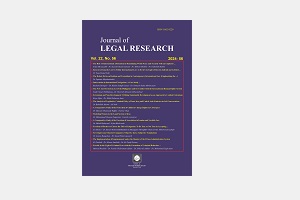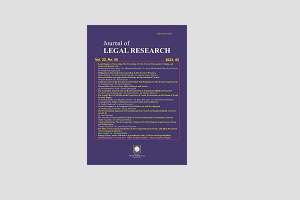Journal of
Criminal Law and Criminology
Number 16
Vol. VIII ● No. 2
Autumn – Winter 2020
Managing Editor: Vahid Eshtiagh
Editor-in-Chief: Mohammad Ashoori
CONTENTS
Sexual Violence against Yazidi Women as Genocide with Emphasis on Rwandan International Court’s Judgment in Akayesu Case
Dr. Ali Khaleghi & Mohammadreza Barzegar
Deterrence of Ta’zirat Organization Strategies (Case Study of Health, Drug and Treatment Delinquency in Ilam)
Nematallah Byranwandy & Dr. Ghobad Kazemi
Mitigating Circumstances in the ICC Sentencing Judgments
Dr. Sadegh Salimi
The International Criminal Court Approach to Punishment Objectives
Mahdireza Sadeghi & Dr. Seyyed Ghasem Zamani
Realism in Criminal Decision Making
Dr. Ayoub Noorian & Dr. Gholamreza Mohammad Nasl
Summary Proceeding on Sexual Offenses (Challenges and Solutions)
Dr. Hadi Rostami & Naser Ghorbanpur
The Concept and Functions of “Situation” at “the International Criminal Court”
Dr. Mohammad Hadi Zakerhossein
Approaches of Deprosecution in the Light of Individualizing of Criminal Justice Policy
Hossein Fathabadi & Dr. Mohammad Ali Mahdavi Sabet
Super Rationalization in Criminal Policy Making of Iran
Dr. Ali Saffari & Pegah Naderi
Investigating the Triple Crimes (Deforce, Obstruction and Harassment) of the Right in the light of the Difference Interpretations of the Courts
Dr. Abolqasem Khodadi
Assessing the Addiction Impact and Supervisory Status on Child Sexual Abuse with a Focus on the Obtained Samples from Social Emergency Centers in Tehran
Sepideh Shahidi & Dr. Tahmoores Bashiriyeh & Dr. Seyyed Mahdi Saberi & Dr. Asghar Abbasi
Political Foundation and Practical Dilemma of Compensation of Innocent Arrested Persons in Iranian Criminal Process
Jahanbakhsh Soleimani & Dr. Iraj Goldouzian & Dr. Mohammad Rouhani Moghadam
ABSTRACTS
Sexual Violence against Yazidi Women as Genocide with Emphasis on Rwandan International Court’s Judgment in Akayesu Case
Dr. Ali Khaleghi
Associate Professor of Faculty of Law and Political Sciences, University of Tehran, Tehran, Iran
&
Mohammadreza Barzegar
Ph.D. Student, Faculty of Law and Political Sciences, University of Tehran, Tehran, Iran
Abstract:
The Rome Statute and the Convention on the Prohibition of Genocide did not specify sexual violence as the material element of genocide before the trials of the former Yugoslavia and Rwanda; the International Criminal Court for Sexual Violence did not constitute an integral part of genocide. Analysis of the true nature of sexual violence shows that this behavior can form the material element of genocide. In 2014, ISIS forces seized the Iraqi city of Sinjar, seized about 6,000 Yazidi women, raped some, took some of them to the slave market in Syria and Iraq, and traded them as sex slaves. In 2016, the UN Commission on Research announced that ISIS committed genocide against the Yazidi minority, subsequently in 2017 issued resolution 2379, which provided the preparation for investigations into ISIS’s crimes. The present study, after examining the interviews of Yazidi women conducted by the United Nations, researchers and the media and taking into account the facts of the subject and the comparison of the former jurisdiction and international law, concluded that ISIL had committed genocide from the conduit of sexual violence against the Yazidi minority, and that the International Criminal Court could prosecute the crime based on its own competence or the reference to the Security Council.
Keywords: Sexual Violence, Rape, Genocide, ISIS, Yazidi Women.
Deterrence of Ta’zirat Organization Strategies (Case Study of Health, Drug and Treatment Delinquency in Ilam)
Nematallah Byranwandy
Ph.D. Student in Criminal Law and Criminology, Faculty of Law and Political Sciences, Islamic Azad University, Kermanshah Branch, Kermanshah, Iran
&
Dr. Ghobad Kazemi
Assistant Professor of Faculty of Law and Political Sciences, Islamic Azad University, Kermanshah Branch, Kermanshah, Iran
Abstract:
Delinquency in the field of health, medicine, and treatment are among the behaviors whose injuries usually affect a wide range of people in the community. It is clear that controlling these behaviors is to prevent them from spreading their detrimental effects and, most importantly, to deter repetition, including the goals and missions of organizations involved in the field of ta’zirat justice. One of the most important organizations in Iran is the government sanctions organization, which has pursued the goal of reducing the number of violations by pursuing preventive strategies and implementing deterrent measures. In this study, through descriptive-analytical research and questionnaire tools, SPSS software was used to analyze the level of deterrence strategies of the organization against the mentioned violations. Overall, the results of this study show that proper implementation of surveillance programs and identifying violations and providing answers can provide the greatest deterrence. The field findings also show that, contrary to the opinion of the audience, the severity of punishment in practice has not helped to create deterrence.
Keywords: Deterrence, Ta’zirat, Health, Medicine, Treatment.
Mitigating Circumstances in the ICC Sentencing Judgments
Dr. Sadegh Salimi
Associate Professor of International Law Department, Faculty of Law, Islamic Azad University, Central Tehran Branch, Tehran, Iran
Abstract:
The International Court of Justice has scrutinized both aggravating and mitigating circumstances from its ever lightest sentence against Mr. Almahdi in 2016 to its heaviest sentence against Mr. Ntaganda in 2019 and other sentencing decisions. This paper is aimed to analyze principles governing on mitigating circumstances in ICC Judgments recommendable to Iranian domestic law. In order to scrutinize the evidence and reasoning of the parties regarding the aggravating or mitigating circumstances, the trial chamber may on its own motion or at the request of the Prosecutor or the accused hold a further hearing to hear any evidence or submissions relevant to the sentence. Then it accepts or rejects the submissions of the parties one by one by its detailed reasoning. This procedure is advisable for our domestic law.
In this Descriptive-Analytical research analyzing and comparing various sentencing judgments it is found that to establish mitigating circumstances, the court takes into account all personal circumstances and behaviors of the convicted person from early steps of committing crimes, after commission, surrender to the court, during detention, trial and imprisonment. Because of the gravity of international crimes even if various mitigating circumstances established, the minimum imprisonment will not be less than two years.
Keywords: Mitigating Circumstances, ICC, Sentence, Balance of Probabilities.
The International Criminal Court Approach to Punishment Objectives
Mahdireza Sadeghi
Ph.D. Student in International Law, Faculty of Divinity and Law, Islamic Azad University, Science and Research Branch, Tehran, Iran
&
Dr. Seyyed Ghasem Zamani
Professor, Department of Public and International Law, Faculty of Law and Political Sciences, Allameh Tabataba’i University, Tehran, Iran
Abstract:
The International law system lacks a specific method in relation to punishment and the evaluation of its objectives. As some national systems, with the transition from the traditional system of punishment to the category of restorative justice, are concerned, the international criminal system pursues an idealistic goal of punishment in the style of the classical internal system. International criminal tribunals, including the ICC, in accordance with the special conditions created within the framework of it, have a special namely peace and reconciliation and at the same time general approach namely classic aims to the aims of punishment. The ICC’s approach can be influenced by the procedural law of other international criminal tribunals and preamble of Rome statute. The ICC has also tried to integrate elements of the restorative justice of domestic Legal system into the international criminal justice system in a normative and practical manner. However, reparation in the iCC is not part of the punishments objective but it is effect of punishment
Keywords: Punishment Objectives, The International Criminal Court, Restorative Justice, International Crimes, Criminal Justice, Classical and Modern Approaches of Punishment.
Realism in Criminal Decision Making
Dr. Ayoub Noorian
Department of Criminal Law and Criminology, Faculty of Law, Central Tehran Branch, Islamic Azad University, Tehran, Iran
&
Dr. Gholamreza Mohammad Nasl
Department of Criminal Law and Criminology, Faculty of Law and Political Sciences, Karaj Branch, Islamic Azad University, Alborz, Iran
Abstract:
Judicial decision-making, regardless of whether it should be fair and in accordance with the rules and regulations, is influenced by various factors such as the inadequacy of the set of rules and legal rules to answer all issues, lawsuits, attitudes and personality of the judiciary, judicial expediency. Judicial decision-making is the perception and reading of a judge as a human being from the text of the law; Because the law is fixed after approval, but society is faced with various changes and developments. Accordingly, in the face of the slow performance of the legislature, social, economic, and cultural issues are rapidly changing. In the meantime, it is the judge who adapts the law to the existing facts to the best of his ability and makes decisions.
The main purpose of the present article, which is a descriptive-analytical research and is based on documentary method, in addition to reviewing and rethinking theories of formalism and realism, examining the contexts and manifestations of judges’ tendency to realism and avoiding formalism in decision. The question is, should judges in judicial decision-making in criminal matters pay attention to the facts and the fairness of the sentences, or should they enforce the laws unquestioningly? Therefore, after examining the theories of formalism and realism, we turn to the fields of tendency of judges to realism in criminal decision making and the manifestations of this tendency in criminal decision making.
Keywords: Formalism, Realism, Interest Survey, Criminal Law, Judicial Decision-Making.
Summary Proceeding on Sexual Offenses (Challenges and Solutions)
Dr. Hadi Rostami
Assistant Professor, Department of Law, Faculty of Humanities, Bu-Ali Sina University, Hamadan, Iran
&
Naser Ghorbanpur
M.A. in Criminal Law and Criminology, Department of Law, Payame Noor University, South Tehran Branch, Tehran, Iran
Abstract:
Iran’s Criminal Procedure Act 2013, in Article 306, provides summary proceedings to sex offenses that its origins go back to a topic in the Shari’a called “Ignoring the Offence”. By examining the philosophy of ignoring the Offence, it is observed that ignoring the offence in the Shari’a has a subjective exit with most of the cases related to the illicit relationship. The Shari’a urges the accused not to confess that he has no claimant and in this case, he wants to confess. In practice, however, the files that begin without the plaintiff’s complaint are very small. The administration of direct trial in the obscenity crime has created unanticipated challenges for judges and plaintiffs and others that led to repeated disagreements between jurisdictions, discouragement of victims, and prolonging the trial process. The current solution to the challenges is to adopt a judicial procedure: If the sex crimes are brought up with other crimes, the prosecution will deal with all the charges together without distinction. Statistical data analysis, conducted through the evaluation of field questionnaires among seventy judges and shown in the form of tables and diagrams, involve the numerous challenges of summary proceeding in sex crimes and the prescribing of a standard approach to dealing with these crimes.
Keywords: Summary Proceeding, Sexual Offenses, Obscenity Crimes, Illegal Relationships, Ignoring the Offence.
The Concept and Functions of “Situation” at “The International Criminal Court”
Dr. Mohammad Hadi Zakerhossein
Assistant Professor, Faculty of Law and Political Sciences, University of Tehran, Tehran, Iran
Abstract:
One of the Statute of International Criminal Court’s construction is the concept of situation. This notion performs various jurisdictional function, including delimiting the scope within which the Court has an authority to exercise its jurisdiction. States Parties to the Rome Statute have a right to refer a situation to the Office of the Prosecutor to warrant further investigation. Moreover, the United Nations Security Council and non-member States have a right to extend the Court’s jurisdiction over a situation related to non-member States. But what a situation means? This piece by reviewing the jurisprudence of the Court in addition to human rights law as an applicable law to the Court shows that a case has a territorial aspect but it does not mean a territory. This piece conceptualizes the notion of situation as a concrete crisis that corresponds with the contextual element of international crimes, i.e. armed conflict of international or non-international character and a widespread or systematic attack against civilian population. Consequently, states and Security Council by determining a situation can limit the Court’s jurisdictional authorities to such a situation.
Keywords: Situation, Case, Armed Conflict, Contextual Element of Crimes, Attack against Civilian Population, State of Emergency.
Approaches of Deprosecution in the Light of Individualizing of Criminal Justice Policy
Hossein Fathabadi
Ph.D. Student in Criminal Law and Criminology, Department of Criminal Law and Criminology, Divinity and Law Faculty, Islamic Azad university, Science and Research Branch, Tehran, Iran
&
Dr. Mohammad Ali Mahdavi Sabet
Ph.D., Faculty Member, Assistant Professor, Divinity and Law Faculty, Islamic Azad University, Science and Research Branch, Tehran, Iran
Abstract:
Criminal justice management by abandoning traditional methods and eliminating retaliation aspects while preserving the effects of restoration aims at reducing the criminal record, the aggravation of cases and the costs of criminal justice. In economic analysis and that of the cost of criminal prosecution, when prosecution, sentencing or execution is not necessary, granting a victim an opportunity to rehabilitate is appropriate, and the crime committed is not an important one, criminal regressive policy proceeds. Our country also in line with the globalization of criminal law and the observance of the UN recommendations has established new institutions such as postponement of prosecution, file archiving, etc., and has expanded the scope of the institutions by adopting the Islamic Penal Code and the Penal Procedure Code 2013 as well as utilizing the capacity of the legal system and the public institutions along with the “criminal validation” approach, while validating the arbitrary institutions that are sometimes neglected. Legislative, judicial and executive Criminal policies changes are in connection with the development of a genuine human rights system, the individualization of criminal justice, prosecution alternatives, deprosecution, and so forth. In this paper, the individualization of criminal justice in the pre-trial phase is examined.
Keywords: Individualization, Abandonment of Prosecution, Mediation, File Archiving, Deprosecution.
Super Rationalization in Criminal Policy Making of Iran
Dr. Ali Saffari
Associate Professor, Faculty of Law, Shahid Beheshti University, Tehran, Iran
&
Pegah Naderi
Ph.D. Student in Criminal Law and Criminology, Faculty of Law, Shahid Beheshti University, Tehran, Iran
Abstract:
Rationality is the factor which can limit the beneficial interventions and interference of the authorized politicians. However, although all different political systems are influenced by rationality, super rationalization makes the process of criminal policy making inefficient. Super rationalization is the result of extreme attention to some limited aspects of rationality while ignoring the other aspects of it by the politicians for interests of their own and their political parties. This is caused by the subjective prejudices of those politicians. In sum, the present article with regard to the theory of mixed rationality heavy of Snellen tries to study and investigate the position of rationality in the process of policy making of Iran. The aim is to discuss the arise of super rationalization. The results suggest that “super rationality” has, at least in some cases, made Iran’s criminal policy system effective by maximizing the intervention of political leaders in the policy-making process and the application of super political, moral, and religious rationality. In a way, rational criminal policy has changed the nature of irrational criminal policy. Accordingly, the application of “mixed rationality” through reviewing the traditional elements of policy-making and strengthening the presence of professional elites and civil society in it, can be a solution to the problem of super rationality in the Iranian policy-making system.
Keywords: Criminal Policy Making, Super Rationality, Political Rationality, Moral Rationality, Religious Rationality.
Investigating the Triple Crimes (Deforce, Obstruction and Harassment) of the Right in the light of the Difference Interpretations of the Courts
Dr. Abolqasem Khodadi
Assistant Professor of Law Department, Shahed University, Tehran, Iran
Abstract:
Currently, the triple crimes (deforce, obstruction and harassment) criminalized in the Article 690 of the fifth Book of the Islamic Penal Code adopted in 1375. In this article, the legislature, by guaranteeing the criminal enforcement, seeks to protect the three claims of possession, including deforce, harassment and obstruction of the right. But the phrase “… and the property belonging to the government or natural or legal persons for the purpose of seizing.” The above-mentioned article caused various interpretations in the judicial procedure. In this paper, by using the thematic analysis method, the opinions of criminal courts in this regard are examined and it was modeled in the form of four interpretations. The main axis of the difference in judicial interpretations, the two pillars of “possession” or “ownership” are based on the conditionality or non-conditionality. The critique of scattered judicial interpretations is based on how the literal interpretation of the meaning of the word “belonging” as well as the legal basis of the legislature’s support for the institution of “possession”. In the present article, a view based on the condition of the three pillars of aggressive possession along with the condition that the possession is legitimate is presented as a new idea of the material elements of the crime of aggressive possession. This view does not separate criminal aggression from its origin in civil proceedings, but at the same time, in order to enjoy the maximum guarantee of criminal enforcement, the legitimacy of the plaintiff’s seizure must be established on the basis of the types of legal affiliation between persons and property. By analyzing the crime of aggressive possession in the new idea, the solution of a number of judicial issues is presented and the relation of the crime of aggressive possession with the crime of harassment and obstruction of the right is redefined.
Keywords: Deforce, Ownership, Judicial Procedure, Obstruction and Harassment of the Right.
Assessing the Addiction Impact and Supervisory Status on Child Sexual Abuse with a Focus on the Obtained Samples from Social Emergency Centers in Tehran
Sepideh Shahidi
Ph.D. Student of Criminal Law and Criminology, Department of Law, Chalous Branch, Islamic Azad University, Chalous, Iran
&
Dr. Tahmoores Bashiriyeh
Assistant Professor, Ph.D. of Criminal Law and Criminology, Faculty Member of Department of Criminal Law & Criminology, Faculty of Law and Political Sciences, Allameh Tabataba’i University, Tehran, Iran
&
Dr. Seyyed Mahdi Saberi
Associate Professor of Psychiatry, Academic Member of Legal Medicine Research Center, Department of Forensic Psychiatry, Legal Medicine Organization, Tehran, Iran
&
Dr. Asghar Abbasi
Assistant Professor, Department of Law, Chalous Branch, Islamic Azad University, Chalous, Iran.
Abstract:
Background: The main purpose of this study is to identify the effective causes of child sexual abuse of girls and boys under the age of 15 among those referred to four social emergency centers located in Tehran province.
Study Method: For this purpose, two indicators of parental alcohol or narcotics addiction and child custody status were studied as effective factors. Each of these factors was selected using a researcher questionnaire and available sampling method. Using the information obtained with the help of SPSS software, it was entered into statistical tables. Then, the relationship between the variables was examined through the relevant statistical tests, and the correlation coefficient was analyzed.
Findings: The research sample consists of 121 girls and boys up to 15 years old in Tehran province whose social emergency has reported cases of sexual harassment. The results of data analysis indicate that there is a statistically significant relationship between sexual victimization and two indicators of parental alcohol or drug addiction and child custody status.
Conclusion: Testing the hypotheses suggests that many factors such as: family and social reasons play a role in the occurrence of child abuse that due to the need to identify these factors to prevent child victimization, it is necessary to help identify and investigate these factors.
Keywords: Addiction, Supervision, Sexual Victimization, Social Emergency.
Political Foundation and Practical Dilemma of Compensation of Innocent Arrested Persons in Iranian Criminal Process
Jahanbakhsh Soleimani
Ph.D. Student, Criminal Law and Criminology Department, Semnan Branch, Islamic Azad University, Semnan, Iran
&
Dr. Iraj Goldouzian
Assistant Professor, Criminal Law and Criminology Department, Faculty of Law and Political Sciences, Karaj Branch, Islamic Azad University, Alborz, Iran
&
Dr. Mohammad Rouhani Moghadam
Assistant Professor, Jurisprudence and Principles of Islamic Law Department, Semnan Branch, Islamic Azad University, Semnan, Iran
Abstract:
Innocent arrested accused is a person who is derived from one of fundamental human rights, i.e. His/ her liberty, in a period of time. Due to fairness and justice rules, if a citizen does this act and deprive someone from his/ her liberty, he has to compensate. However, this arrest is imposed based on the governmental acts, so if the state should convict and compensate to the defendant is an important issue in any legal system that this paper will be scrutinized. It reviews the most important political theories, i.e. Social contract (on the legitimacy) and Rawl’s theory of justice to consider this question. After finding the political foundation, it will consider the Iranian Criminal procedure in related to compensation of the innocent arrested defendants and offenders and finally proposes some solutions for the efficiency of Iranian Criminal Procedure Act in this respect.
Keywords: Arrest, Defendant, Compensation, Virtual Damages, Acquittal.





